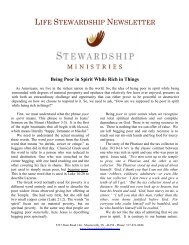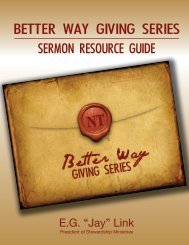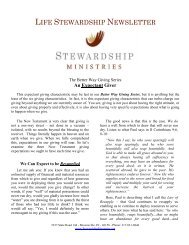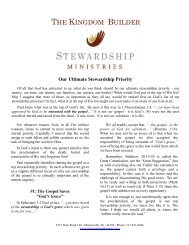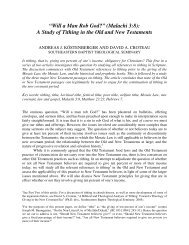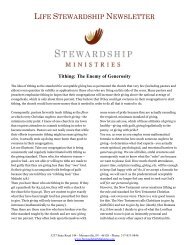TITHING IS NOT A CHRISTIAN DOCTRINE - Stewardship Ministries
TITHING IS NOT A CHRISTIAN DOCTRINE - Stewardship Ministries
TITHING IS NOT A CHRISTIAN DOCTRINE - Stewardship Ministries
Create successful ePaper yourself
Turn your PDF publications into a flip-book with our unique Google optimized e-Paper software.
out of a sincere desire (8:8, 10, 12; 9:7). (6) Do not give because of any commandment (8:8, 10;<br />
9:7). (7) Give beyond your ability (8:3, 11-12). (8) Give to produce equality. This means that those<br />
who have more should give more in order to make up for the inability of those who cannot afford<br />
to give as much (8:12-14). (9) Give joyfully (8:2). (10) Give because you are growing spiritually<br />
(8:3-4, 7). (11) Give because you want to continue growing spiritually (9:8, 10-11). (12) Give<br />
because you are hearing the gospel preached (9:13).<br />
Point #2: Defining Tithe: In God’s Word the Holy Tithe was Always Only Food<br />
from Inside Israel! (Chapter 1)<br />
The false teaching is that holy biblical tithes include ALL sources of income.<br />
DEFINITION: True biblical holy tithes were always only food from the holy farms and herds of<br />
Israelites who lived inside God’s holy land, the national boundary of Israel.<br />
In God’s Word tithe does not stand alone. Although money existed before tithing, the source of<br />
God's holy tithe over 1500 years was never money. It was the holy tithe of food and the increase<br />
was gathered from what God miraculously produced from His holy land and not from man's craft<br />
or ability. No tithes could come from Gentiles or unclean pagan lands.<br />
There are 16 verses from 11 chapters and 8 books from Leviticus 27 to Luke 11 which describe<br />
the contents of the holy tithe. And those contents never included money, silver, gold or anything<br />
other than food from inside Israel! Yet the incorrect definition of tithe is the greatest error being<br />
preached about tithing today! Lev 27:30, 32; Num 18:27-28; Deu 12:17; 14:22-23; 26:12;<br />
2 Chron 31:5-6; Neh 10:37; 13:5; Mal 3:10-11; Matt 23:23; Luke 11:42.<br />
Point #3: Money: Money was an Essential but Non-Tithed Item. (Chapter 1)<br />
The false assumption is that food barter usually replaced money.<br />
One argument to support non-food tithing is that money was not universally available and barter<br />
from food was used for most transactions. This argument is neither biblical nor historical. Genesis<br />
alone contains money in 32 texts and the word occurs 44 times before the holy tithe is described<br />
in Leviticus 27. Gold is in Genesis 2:12. The words jewelry, gold, silver and shekel also appear<br />
often from Genesis to Deuteronomy.<br />
Abram was very rich in silver and gold (Gen 13:2); money in the form of silver shekels paid for<br />
slaves (Gen 17:12+); Abimelech gave Abraham 1000 pieces of silver (Gen 20:16); Abraham paid<br />
400 pieces of silver for land (Gen 23:9-16); Joseph was sold for silver pieces (Gen 37:28); slaves<br />
bought freedom (Lev 25:47-53). Court fines (Ex 21 all; 22 all), sanctuary dues (Ex 30:12+), vows<br />
(Lev 27:3-7), poll taxes (Num 3:47+), alcoholic drinks (Deu 14:26) and marriage dowries<br />
(Deu 22:29) included money.<br />
Joseph gave Benjamin 300 pieces of silver (Gen 45:22). According to Genesis 47:15-17 food was<br />
used for barter only after money had been spent. Banking and usury laws exist in Leviticus even<br />
before tithing. Therefore the argument is false. Yet the holy contents from Leviticus to Luke never<br />
include money from non-food products and trades.



